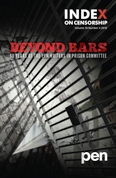Day of the imprisoned writer
 It’s vital for democracies that we allow the free flow of information and ideas. On the Day of the Imprisoned Writer, Index on Censorship calls for a renewed campaign to support writers under threat
It’s vital for democracies that we allow the free flow of information and ideas. On the Day of the Imprisoned Writer, Index on Censorship calls for a renewed campaign to support writers under threat
(more…)
 It’s vital for democracies that we allow the free flow of information and ideas. On the Day of the Imprisoned Writer, Index on Censorship calls for a renewed campaign to support writers under threat
It’s vital for democracies that we allow the free flow of information and ideas. On the Day of the Imprisoned Writer, Index on Censorship calls for a renewed campaign to support writers under threat
(more…)
The Saudi Arabian government broke the Arabic record for the fastest time to block a new website, clocking in at just 15 hours. On 25 April, they blocked a US- based site created by Egyptian activists The Egyptian Association for Change, eacusa.org, only 15 hours after it launched. Tunisia was the previous record holder, blocking www.yezzi.org in 18 hours after it went live in 2005.

Focus, partnership and joined-up advocacy in defence of human rights – the UK Foreign Office’s lost vocation, as revealed by the diplomats’ own annual report. Rohan Jayasekera comments
(more…)
Tunisian President Zine al Abidine Ben Ali has won a fifth term in office, receiving 86% of the vote. The election outcome was expected. Tunisia’s most prominent opposition figures did not take part in the election, while one of Ali’s challengers on the ballot acknowledged he had no chance of winning. Human rights organisations claim the election took place in an atmosphere of repression and signs of media pluralism were said to be absent in the run up to the elections. Written and broadcast media remained tireless in their praise of the president-candidate throughout the campaign and a strong police presence and media censorship disabled balanced news reporting. There were widespread reports of forced expulsion, intimidation and physical attacks on journalists.